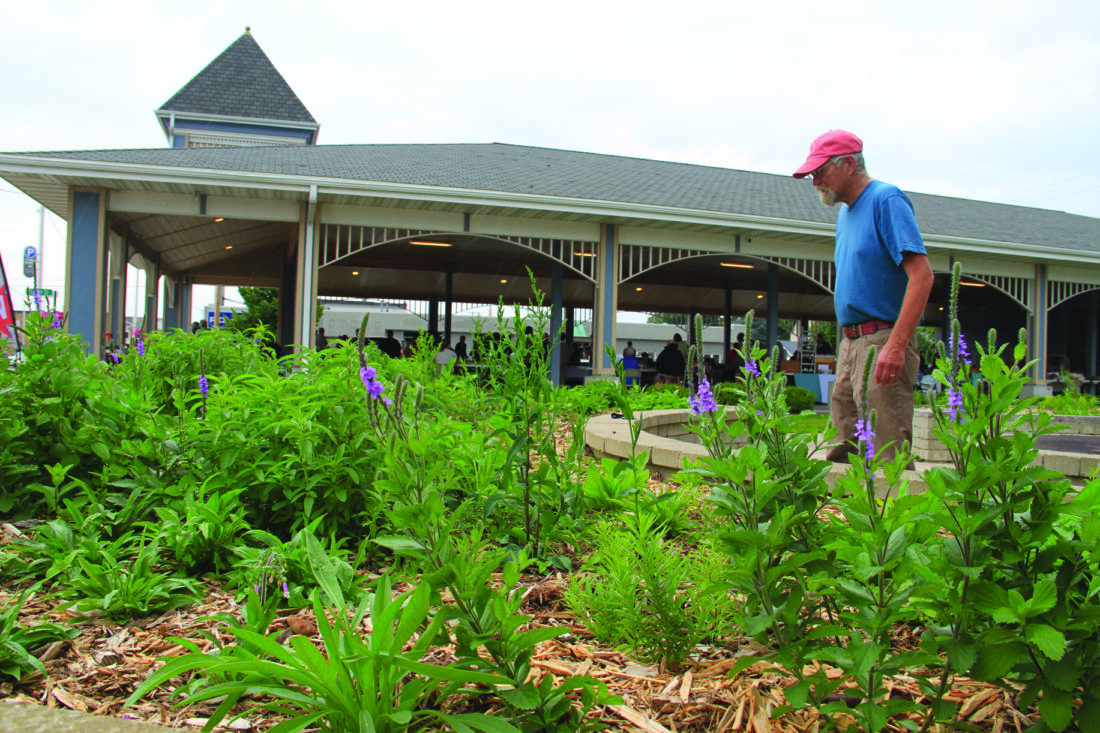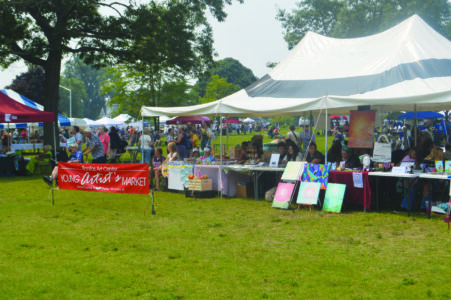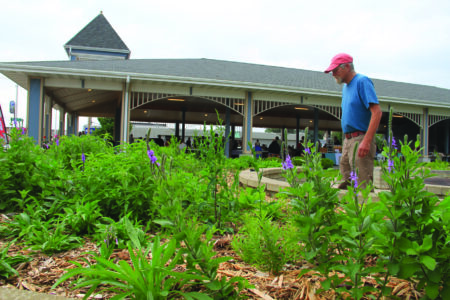Marketplace garden aims to help pollinators

R. R. Branstrom | Daily Press A handful of individuals, including Glenn VandeWater, pictured, planted flowers and other greenery at the raised beds near the Escanaba Marketplace last month in an effort help native species proliferate.
ESCANABA — Native plants were planted at the raised garden near the Escanaba Marketplace about a month ago, thanks to the Delta Conservation District and5 the Escanaba Downtown Development Authority (DDA).
Immediately next to the marketplace pavilion and in front of the music stage painted with a mural stands the stone-framed garden around a fireplace. Previously, shrubs planted eight years ago had occupied the beds, but the area wasn’t kept up and had gotten overgrown.
“One of the things that we (the DDA) were just kind of looking at is what can be done with the gardens,” said DDA Directd///r Craig Woerpel. “Out of the clear blue, the Delta Conservation District called and said, ‘Hey, would you be interested in putting a pollinator garden at Center Court?'”
Center Court is a few blocks away at 11th Street and Ludington Street, while the marketplace is on the 15th block.
Although the initial idea was to put in a garden at Center Court that would foster an environment beneficial to pollinators, Woerpel and Glenn VandeWater of the Delta Conservation District walked down to the marketplace and both agreed the gardens there, which have boundary walls and are irrigated, would be a good place to start.
“Part of the mission of the conservation district is to work with municipalities to foster and promote conservation, and one of the things that’s been a hot button all over, globally and nationally, has been the loss of pollinators. Bumblebees are having a tough time throughout the world. Numerous insect species are declining rapidly,” said VandeWater.
“I’m a big believer in more bees, and monarch butterflies are extremely important to our area,” said Woerpel. “And that’s why we were more than willing to participate and let them give a try at it. I like partnering with different groups, and to have them take over this portion is going to be nice. And if it can be a learning center for people, that’s even more fantastic.”
This spring, preparation began. Existing plants and old mulch was removed, and some fresh soil was added on top of the existing soil mixture. Wildflowers can thrive in soil that many gardeners would find less than desirable for their more finicky plants, VandeWater explained.
Five volunteers affiliated with the conservation district planted a little over 800 individual plants — 35 different species, VandeWater reported.
“I tried to diversify it from what I knew would grow here or should grow here,” he said.
Several species of milkweed, helianthus (sunflowers), aster, blazing stars, prairie smoke, wild onion, strawberry, harebells and vervain were among the plants VandeWater pointed out in the garden three weeks after they’d been planted. Eventually, signs may go in to help identify the various vegetation and provide info about what type of insects frequent and pollinate each.
Some of the plants came from the Bay College nursery, where VandeWater works with Brian Black; others came from a native plant nursery in Marquette called Designs by Nature. Funds for their purchase were supplied by the Delta Conservation District.
VandeWater was very pleased with how well the plants have thrived so far. The weather, not too sunny and hot this July, definitely helped. Bees have found the garden and are visiting the flowers that have bloomed.
Weeds have certainly fought to take their place in the garden; Vandewater said he’s weeded it on average once a week already. But constant maintenance won’t be required; once it fills in a bit, it should be relatively self-regulating, theoretically.
VandeWater said he’s been “babying” the garden for now to make sure the initial growth takes off — and it’s been great so far with low mortality. He intends to add more mulch in autumn.
Another wildflower garden is found across from Mug Shots bar. Called Esky Grow, it used to provide vegetables to local food pantries; now, it’s a haven for pollinators.
Like many organizations, Delta Conservation District is one that could stand to benefit from more engagement. To get involved, an interested party may call 906-553-7700, visit the website (deltacd.org) or Facebook page (Delta Conservation District) or attend a meeting. A event celebrating 75 years of conservation in Delta County will take place from 3 to 6 p.m. at the Pioneer Trail Park pavilion on Aug. 20.




